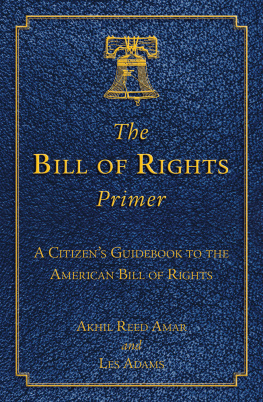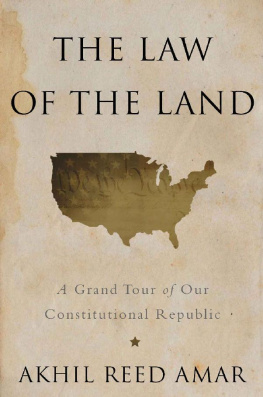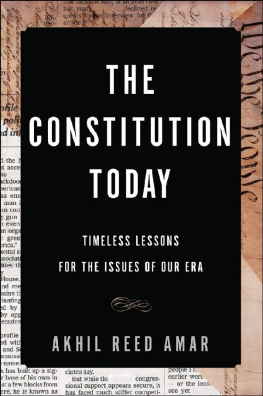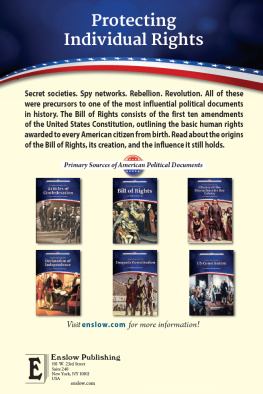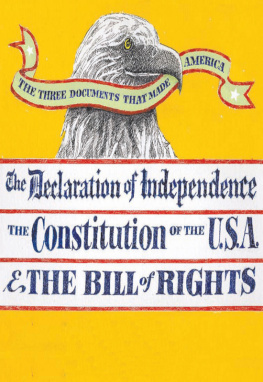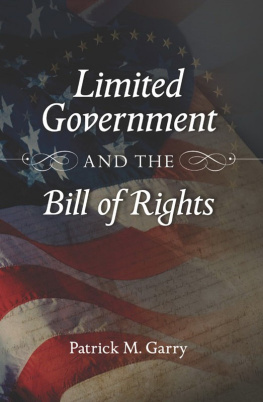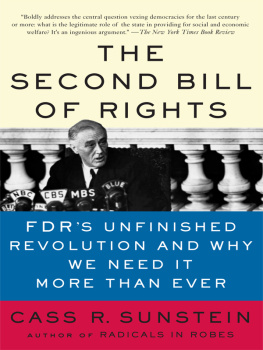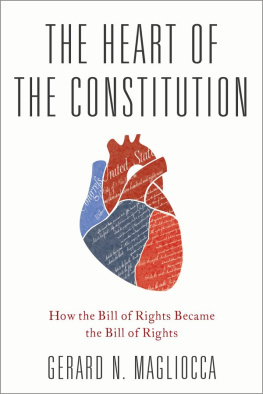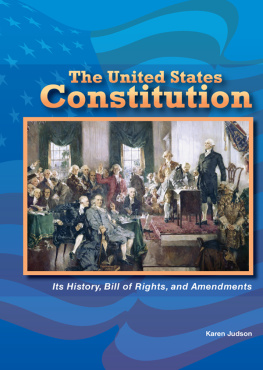THE
BILL OF RIGHTS
PRIMER
THE
BILL OF RIGHTS
PRIMER
A CITIZENS GUIDEBOOK TO
THE AMERICAN BILL OF RIGHTS
AKHIL REED AMAR AND LES ADAMS


Skyhorse Publishing
All Rights Reserved. No part of this book may be reproduced in any manner without the express written consent of the publisher, except in the case of brief excerpts in critical reviews or articles. All inquiries should be addressed to Skyhorse Publishing, 307 West 36th Street, 11th Floor, New York, NY 10018.
Skyhorse Publishing books may be purchased in bulk at special discounts for sales promotion, corporate gifts, fund-raising, or educational purposes. Special editions can also be created to specifications. For details, contact the Special Sales Department, Skyhorse Publishing, 307 West 36th Street, 11th Floor, New York, NY 10018 or info@skyhorsepublishing.com.
Skyhorse and Skyhorse Publishing are registered trademarks of Skyhorse Publishing, Inc., a Delaware corporation.
Visit our website at www.skyhorsepublishing.com.
10 9 8 7 6 5 4 3 2 1
Library of Congress Cataloging-in-Publication Data is available on file.
ISBN: 978-1-62087-572-8
Printed in India
CONTENTS
ABOUT THIS BOOK
by Les Adams
In 1997,1 wrote a little book entitled The Second Amendment Primer. It was more or less a labor of love, my hope being that perhaps a few thousand people or so would share my interest in an authoritative but easy-to-read book on the history and development of our right to keep and bear arms. Much to my surprise, the book became a bestseller. In just three years, sales have reached 500,000 copies, and the books continue to sell at a brisk pace.
Soon after my book on the Second Amendment was published, I began receiving letters from readers suggesting that I write a similar book on all the original amendments to the Constitution the entire Bill of Rights. That seemed like a good idea to me, so I began my research and initial drafting of such a book in early 1998.
Then several months later, Yale University Press published The Bill of Rights: Creation and Reconstruction by Akhil Reed Amar, professor of law at Yale Law School. Amars book is a brilliant piece of work. It was selected to receive a Gavel Award Certificate of Merit in the Book Category in the 1999 Competition for the Media and the Arts, given by the American Bar Association. Here is a sampling of the reviews his book has been receiving in academic and legal circles:
Readers suggested a primer on the Bill of Rights
Commentary on Amars book
One of the most important books about constitutional interpretation of its generation.
Jeffrey Rosen, American Lawyer
Amar... takes us on a historical odyssey.... [He] offer[s] a striking and original analysis of the political values embodied in the amendments.... Amars stimulating republican interpretation restores the states and the people to their rightful place in the constitutional story.
James Henretta, New York Times Book Review
A methodological tour de force.... [0]ne of the most valuable works on constitutional scholarship written in the modern era.
Steven Calabresi, co-founder of the Federalist Society
Essential reading for anyone who claims to care about the history of liberty in America, from the AC LU to the NRA to the Federalist Society. Todays Bill of Rights, Amar shows, owes less to the Founding Fathers of the 1780s and more to the antislavery crusaders of the 1860s women alongside men, blacks alongside whites than many of us had realized.
Nadine Strossen, professor,
New York Law School, and
national president, American
Civil Liberties Union
Akhil Amar is one of the most creative thinkers in the legal academy. Not surprisingly, he has produced the best book ever written about what we call the Bill of Rights.
Sanford Levinson, professor,
University of Texas Law School
Amars argument is nothing short of brilliant: he recasts our understanding of the Bill of Rights in ways that have profound implications. No one presently writing is better able to combine legal and historical analysis.
Michael Les Benedict, professor,
Ohio State University
Authors agree to collaborate on a new book that will marry scholarly content with popular style
By viewing the Bill of Rights as a document with an evolving meaning shaped by history, and by stressing how the Civil War and Reconstruction transformed the Bill of Rights, Amar has made a major contribution to the history of American liberties.
Erie Foner, professor,
Columbia University
How could I possibly write anything that would achieve this level of acclaim? So, subscribing to the theory if you cant beat em, join em, I contacted Amar and suggested that we collaborate on a new book combining the masterful scholarly content of his book with the demonstrably popular style and organization of mine. What if, I asked, we were to transform Amars work (which, after all, is a scholarly treatise with a sophisticated organization, style, and vocabulary, aimed at a learned audience of judges, lawyers, and historians) into a more accessible and easily read book like The Second Amendment Primer? That is, what if we could create a book that would tell the great story of the Bill of Rights in a reader-friendly style without the loss of one whit of historical accuracy or legal erudition, but with an organization and vocabulary that most everybody would be comfortable with a book that was easy to read and easy to refer to? Wouldnt that be something? We thought so, and hope you agree.
Easy to read. Easy to refer to.
New book includes features found to be popular inThe Second Amendment Primer
The organization of The Bill of Rights Primer is similar to that of The Second Amendment Primer. The preface presents a short historical survey of the people, events, decrees, legislation, writings, and cultural milestones, in England and the American colonies, that influenced the Founding Fathers as they drafted the U.S. Constitution and the Bill of Rights. (Incidentally, this section is written solely by me, and the responsibility for any omissions, errors, or factual misinterpretations in the text is mine alone.) The remaining chapters, co-authored with Amar, are a condensation of his book.
The book also includes features that proved to be especially helpful to readers of The Second Amendment Primer:
Important points are summarized in short notes at the side of the text.
To present an uncluttered page thats easy to read, all reference and quotation sources are placed in a separate section of notes at the end of the book.
Throughout the book, we have tried to provide synonyms for most of the fancy words that lawyers and scholars sometimes use and for obsolete words or words that no longer mean what their writers intended. However, since the Bill of Rights, is, after all, a legal and historical document, to discuss it adequately we simply cannot avoid the use of some legal or scholarly words and expressions for which there are no adequate synonyms. Therefore, we have provided a short glossary on page 389. (It might assist your comprehension if you briefly review this glossary before you begin reading the text.)
Also at the back of the book are three reference sections: biographical profiles of all notable figures discussed or quoted in the text; endnotes; and an index.

